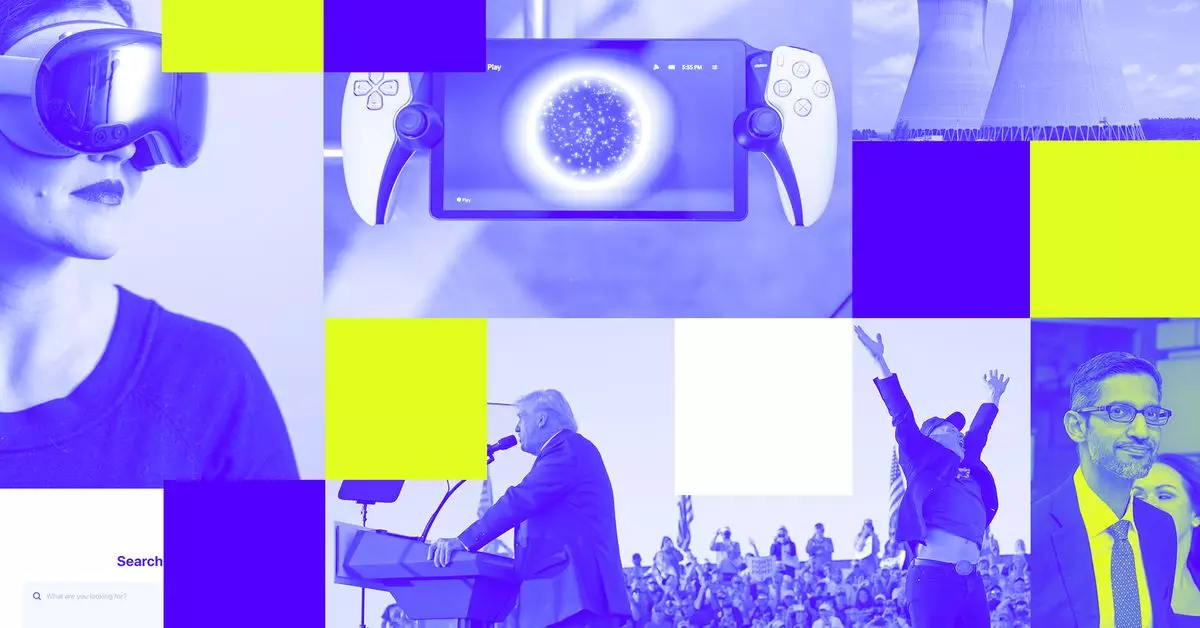As we approach the end of 2024, it’s crucial to examine how the technology landscape has been reshaped over the past year. The mainstream technological narrative has been dominated by significant events and innovations that have not only drawn attention but also redefined our interactions with gadgets and services. One major highlight was the debut of Apple’s Vision Pro, which stirred excitement and anticipation as it signaled a new era in augmented reality. This launch is part of a broader trend where companies are vying to entice consumers away from the ubiquitous smartphone, attempting to entice them with novel functionalities that promise to enhance daily life in profound ways.
This year also saw Google face serious scrutiny, being labeled a monopoly, pushing discussions around tech regulation into the spotlight. As society grapples with concerns over digital privacy and monopolistic practices, this examination of corporate power remains essential. Consumers are increasingly aware of how their data is utilized, resulting in a call for more accountability and transparency within the tech industry.
The ongoing buzz surrounding artificial intelligence has permeated numerous sectors, from creative industries to healthcare. In 2024, AI’s inflated hype reached new heights as more companies, both established giants and nimble startups, pushed the boundaries of what is possible. Yet, the mounting excitement surrounding these innovations raises questions about the sustainability of AI’s trajectory. Are we genuinely experiencing a revolution, or are we caught in a cycle of overhyping technology that is still in its infancy?
With advanced AI systems now capable of performing complex tasks that once seemed exclusive to human intellect, there are ethical and practical implications that society has yet to fully grasp. Debates over job displacement, bias in algorithms, and the overall impact of AI on daily life have become more urgent, suggesting that as we embrace such technology, we must also be vigilant about its potential pitfalls.
Looking closely at the political landscape, the rise of figures like Elon Musk, who has increasingly entwined his endeavors with the realms of technology and social media, alters the cultural narrative. His influence has ignited conversations about the responsibilities of tech leaders in shaping societal structures and the importance of ethical practices in their innovations. Musk’s antics often overshadow deeper issues within the tech community, yet they encourage a discussion on how technology intersects with our political frameworks.
The recent US elections also illuminated the critical role social media plays in political discourse, raising questions about misinformation and the platforms’ responsibilities. This fusion of politics and tech emphasizes that as our devices evolve, so too must our understanding of the consequences they carry.
As we look toward the future, discussions about technology behind the scenes are vital. In an upcoming episode of The Vergecast, team members will dissect the nuances of the technology media landscape, inviting audiences to pose inquiries surrounding the intersection of media, tech, and societal implications. This reflection not only underscores the importance of transparency but also enhances our connection as consumers of technology and information.
As 2024 draws to a close, it’s evident that our relationship with technology has transformed dramatically. It compels us to ask not just what we adopt but how these tools shape our lives and the society at large. As we hold on to this year’s lessons, it is essential to remain critical and engaged with the rapidly evolving tech landscape.


Leave a Reply